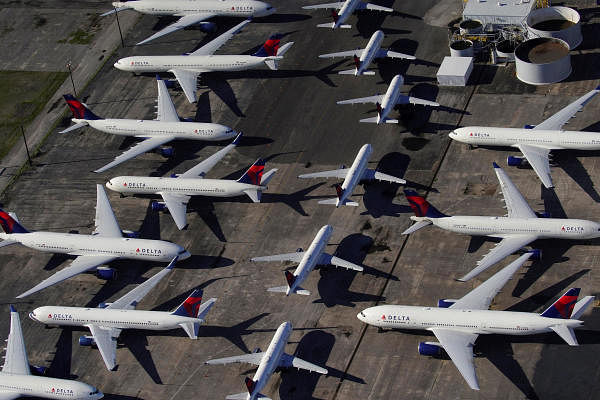
Delta Air Lines announced Thursday it will retire the long-range Boeing 777 aircraft and signalled plans to reduce headcount as the aviation industry continues to reel from coronavirus shutdowns.
The big US carrier, which has lost some 95 percent of passenger revenue amid sinking demand, estimates that it will be overstaffed by 7,000 pilots this fall, according to a memo to employees reviewed by AFP.
"We are looking at all options to minimize potential furloughs and offset impact on our pilots through additional voluntary programs and cost-saving measures," said the memo from Delta senior vice president John Laughter, adding that the company was consulting its elected representatives and considering an early retirement program.
Major airlines around the world are fighting for survival following government-mandated lockdowns to combat the coronavirus. US data this week showed there were fewer than one-tenth the number of passengers compared with the year-ago period.
As part of a federal bailout under the CARES Act, Delta agreed to not undertake involuntary employee layoffs or furloughs through September 30, 2020. Delta will receive $5.4 billion in grants and low-interest loans under the program.
The company is eligible for another $4.6 billion under in loans under the law and is "currently evaluating our level of participation," Delta said in a securities filing last month.
At least one other carrier, United Airlines, has also strongly hinted it will cut jobs this fall.
Delta described the decision to retire the 777 as another belt-tightening move compelled by the brutal operating environment.
"With the unprecedented drop in travel demand amid the COVID-19 pandemic and global economic slowdown, we continue to take action to protect Delta's cash, Delta jobs and Delta's future," Delta Chief Executive Ed Bastian said in a message to employees in which he revealed the company is currently burning $50 million in cash a day.
"Our principal financial goal for 2020 is to reduce our cash burn to zero by the end of the year, which will mean, for the next two to three years, a smaller network, fleet and operation in response to substanially reduced customer demand."
Bastian said the company would turn to the Airbus A330 and A350-900s "which are more fuel-efficient and cost-effective" as replacements for the 18 Boeing planes.
Delta will account for costs of between $1.4 billion and $1.7 billion to retire the 777 by the end of 2020. Airline executives expect demand for domestic flights to return more quickly than for overseas flights.
The US carrier will also accelerate a plan to retire the McDonnell Douglas MD-90 and remove the jets from its fleet in June.
Shares of Delta finished down 0.2 percent at $19.38.